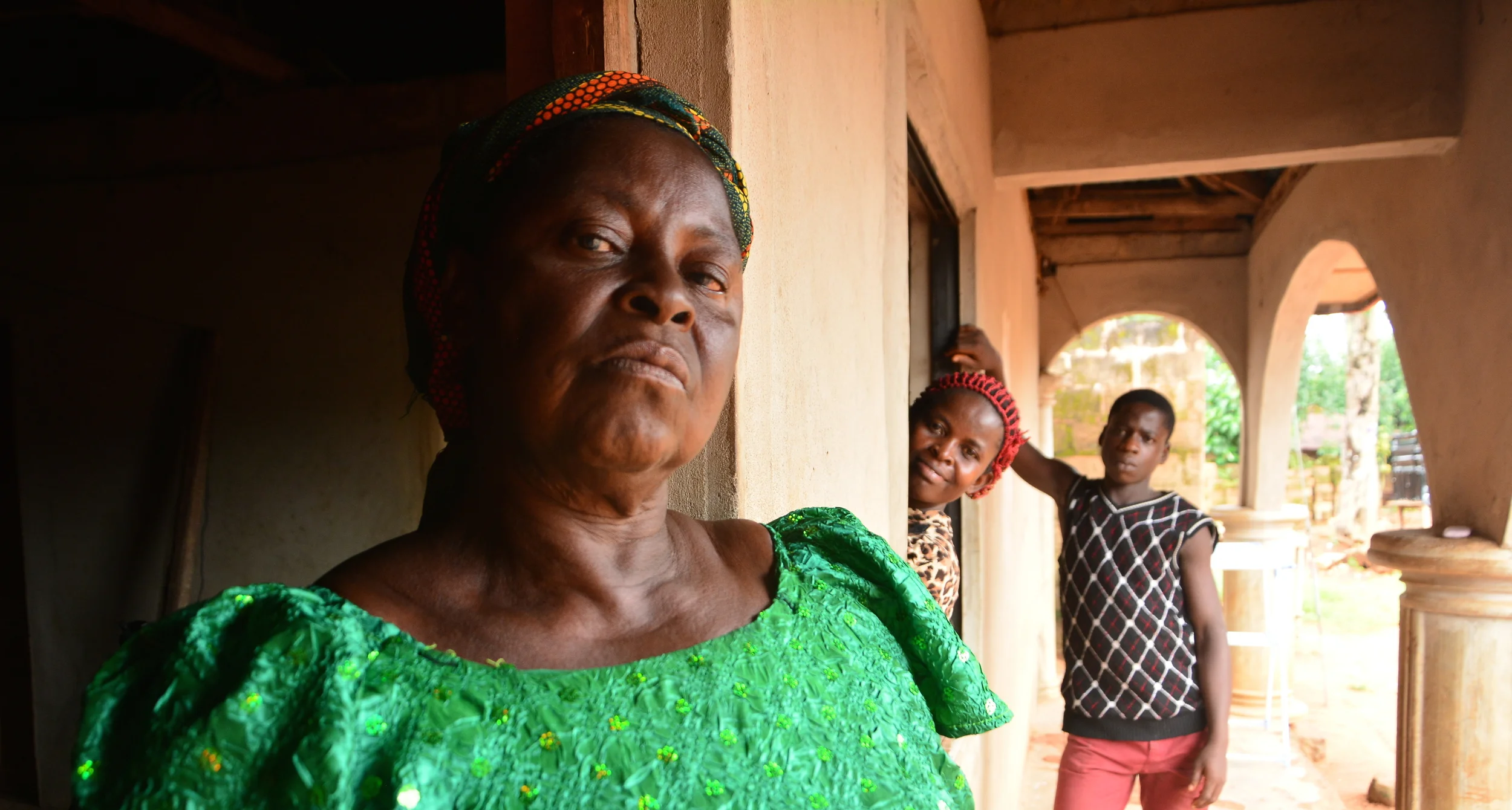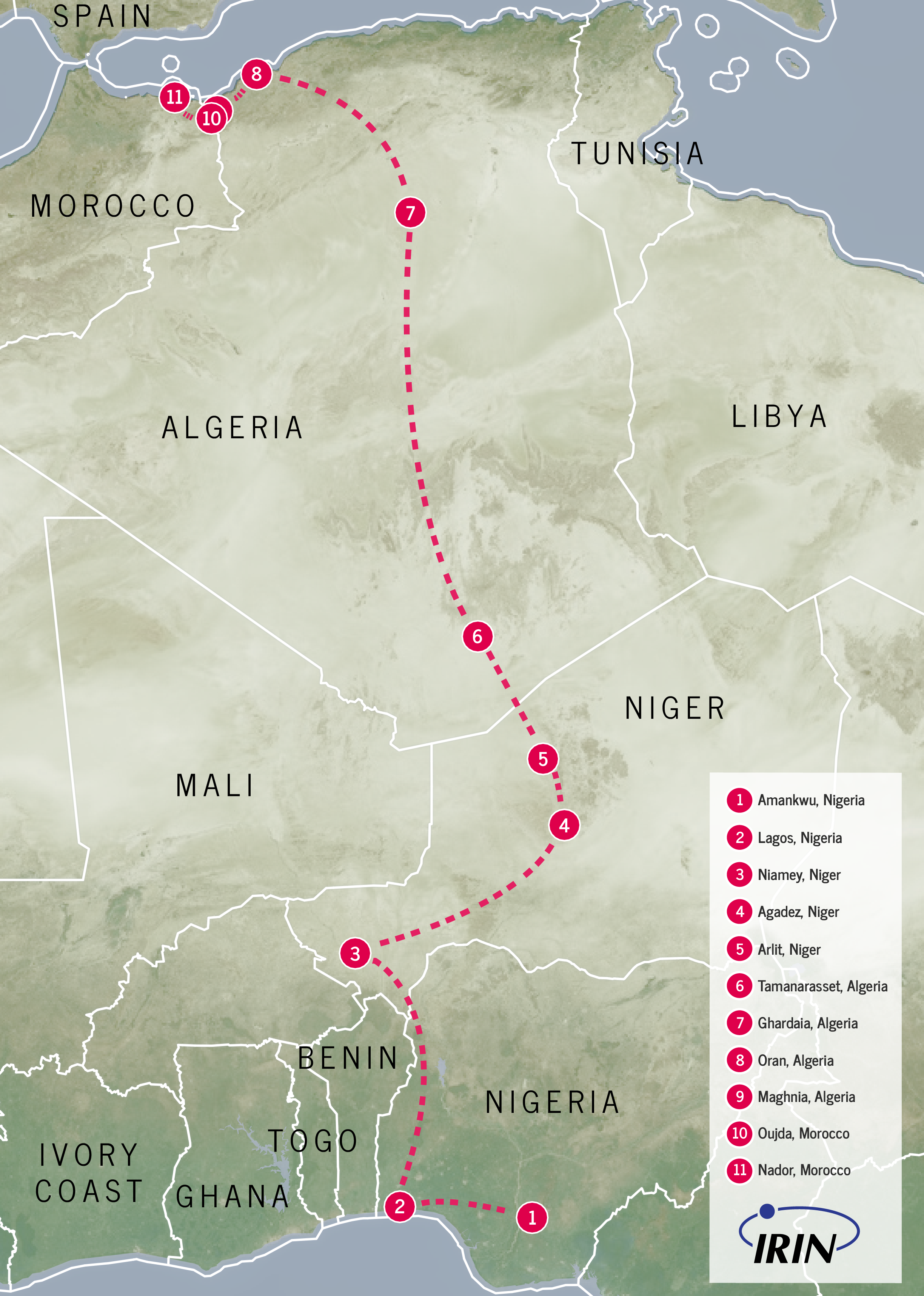By Obi Anyadike in Amankwu, Nigeria and Nador, Morocco
I’ve been guided over the phone to a small village square in Amankwu, in southeastern Nigeria, by a man on a mountain in Morocco. But aside from an elderly couple, there is nobody else here – and that was not the plan.
I met “Biggy”, the man on the other end of the phone, two months earlier living in the forests of Mount Selouane, just outside the northeastern Moroccan city of Nador. The old fishing port of Nador borders the Spanish enclave of Melilla, a historical anachronism that grants Spain 12 square kilometres of territory on the African continent. For undocumented migrants looking to enter Europe, it’s an irresistible lure.
Biggy, 31, is not seeking asylum. He has not been driven from his home by war or disaster, but like many other young men and women living rough on Mount Selouane, he wants a better life for himself and his family back home. And he is prepared to suffer hardship and risk plenty to attain it.
“Our governments don’t look after poor people. That’s why we decided to come out [of Nigeria],” he told me. “Today I may suffer, but tomorrow, if I happen to make it [to Europe], I know my family will lead a better life.”
Lucky's journey from Nigeria to Morocco
But Morocco and Spain work very hard to dissuade migrants from getting into Melilla. A triple-layer, nine-metre-high security fence separates the two territories, manned by border guards with a reputation for being handy with a baton. To add insult to likely injury, Spain’s controversial “hot return” policy means anyone caught is immediately deported back to Morocco.
In the four years he has been in Morocco, Biggy has “touched Spain” six times. But at close to two metres tall, his size works against him: the border guards can see him coming, and pay special attention to his subjugation. After the last beating, his face swollen and unrecognisable, he gave up on the fence. Now he’s looking to raise the money to chip in on a boat and row across to mainland Spain, even though he can’t swim.
Each time I met Biggy during a week-long visit to Nador this past summer, he was guarded, refusing to have his photo taken or divulge his real name. He was with other Igbo migrants (the Igbo are one of Nigeria’s big three ethnic groups known for their drive and determination to succeed) and seemed to hold some sway in their camp.
But his bravado – the “only the strong survive” machismo – was slipping. Four years of the indignity of life as an undocumented migrant, the deprivation, the teeth-grinding frustration has taken a toll. The last time we talked, he admitted to living “like an animal” in the forest, “winter and summer”, constantly dodging the police. He had come to feel it had all been a colossal waste. “I have achieved nothing,” he confessed.
He knew his family’s hopes rested on his shoulders, but despite his strength, charm and resourcefulness, he’d been unable to make it through. So, in our last conversation, he finally gave me the phone number of his sister, Celia, and permission to visit his mother in his village of Amankwu – almost certainly in the hope that I might be moved to help them out.
(Full disclosure: One of my nephews travelled to Europe on dodgy papers and was deported. But I have a host of other family that have never seriously contemplated leaving the country. One quit school to work as a labourer in Lagos port, carrying sacks on his back to help his jobless dad – a tale that always brings a tear to my eye. So stories of migration out of Nigeria hit close to home for me.)
Family affair
Amankwu, in Anambra State, is a busy village of unpaved roads, a market, church, school – and that’s about it. But it is close to the Nnamdi Azikiwe University, named after Nigeria’s nationalist hero and first president, which makes Biggy’s decision to quit his country all the more poignant.
I am in the near-empty village square, on the phone with Biggy, who still refuses to provide his real name – preventing me from asking directions from a couple of curious stall owners. His sister Celia has switched off her phone yet again, and I’m out of airtime anyway. So I tramp through the village looking for more phone credit, wondering whether, bewilderingly, I’m being punked.
Twenty-minutes later, Celia appears, wreathed in smiles, as I’m heading back into the square: the interview with Biggy’s family is finally on.
But why all the secrecy? “Nobody knows he’s in Morocco except his closest friends,” his mother explains when we finally meet. It comes from a Karmic, evil-eye kind of idea, to protect him on his journey. And she quickly clears up the other mystery: Biggy’s real name is Lucky Kodili Nwoye.
I’m in a near-completed house, without a ceiling, that Celia and her mother share. We sit awkwardly in a bare reception area – both of them unsure of the purpose of my visit. Why would a total stranger come all the way from Morocco to Amankwu to visit them?
“I was worried that something had happened to him,” says a now-relieved Mama Lucky. “We hadn’t been able to get through. I thought maybe he was in prison or dead, but the God I serve wouldn’t allow that to happen.”
I came to Amankwu to understand the cost of migration on a family like the Nwoyes – or more precisely, the price of failure. What happens to the families left behind, hoping their loved ones will succeed, yet living in the knowledge, the guilt and the dread that so many perish trying? And how do you cope when you get that call that your son needs a little bit more money, when you are just about getting by as it is?
““Of course it’s been hard – look how we’re living – but it was his idea to go, and we supported him””
Lucky is one of nine children. His father died a few years after he was born, and the family has since struggled. Lucky didn’t finish secondary school until he was in his 20s, picked up a trade as a mason, and worked in the village and nearby main town.
His two elder brothers have similarly hand-to-mouth jobs, one a motorbike taxi rider, the other an unlicensed taxi cab driver. Celia works with her mother on their small farm, and they sell their surplus cassava and cocoa yam in the small market outside the village.
Nigeria has an official unemployment rate of 8.2 percent – surprisingly low due to the power of the informal sector, where even graduates are selling phone airtime cards to make ends meet. But even if more formal jobs were available, research shows that rising expectations in middle-income countries like Nigeria mean migration actually increases rather than recedes. People move because they have the opportunity, with aspirations fuelled – to be simplistic – by watching soaps on TV and social media.
A subsistence lifestyle was not for Lucky. His Facebook profile banner features a BMW 4 Series M coupe convertible parked at an exclusive yacht club. For good measure, the insert image is of a mess of currencies, cans of beer and a packet of Marlboro. His timeline is a full-throttle fetishization of ‘making it’ – post after post of cars, watches, luxury homes, more cars.
Lucky says what drove him out of Nigeria was the urge to set his family up, and provide for his future children. But it was also about his self-worth and status. He wants to “wash the shame of poverty” from his family and show he has just as much grit and gumption as the other young men who hustle in South Africa, China, Malaysia, the US, and Europe.
But he left behind an ageing mother, struggling with rheumatism. “Sometimes it takes me an hour to stand up straight, and I can’t walk far,” she says. When she speaks to Lucky on the phone, maybe once a month, she always insists that she’s well, “so please don’t tell him”.
The family has also had to bail him out – doubling down on the investment. In Niger, early in his journey, Lucky got cheated out of the roughly $1,200 he’d managed to put together for the trip. His mother scraped and borrowed to make two payments to him, one instalment was $350 – the other amount she can’t remember. She says that after that tribulation, he knew he could ask for no more.
“Of course it’s been hard – look how we’re living – but it was his idea to go, and we supported him,” says Mama Lucky.
““To go back is not easy. To go to Europe is not easy. To stay here is not easy,””
When I ask whether it isn’t time for him to come home, she shoots me a look of incredulity. “How will he come back? My God will not allow that. I ask God that anyone that starts a journey will get to his destination. God will favour him and allow him to get to his destination.”
The mood lightens when she talks about how Lucky doted on her – embarrassingly even in public; how he always settled arguments in the house; and was known by everyone. “Does he still laugh his big laugh?” she asks.
What I recall instead is Biggy/Lucky talking fast, almost unintelligibly, as he knocks back cheap vodka. He is angry. There’s nothing for him in Nigeria. He doesn’t think the new government of President Muhammadu Buhari will bring any real change. He just wants to help his family; they’re even worse off than he is. Yet Morocco stops him when all he wants to do is leave.
And then he crashes off into the trees, hollering in raging, impotent frustration.
I can’t tell her this. Or show her the photos stored on my computer of him living in a tent on the stony ground of Mount Selouane, shielding his face so he can’t be identified, looking like a criminal, among other young men, similarly desperate, forlorn.
In Amankwu, the feeling is he must stay until he succeeds, and so Lucky is trapped. “To go back is not easy. To go to Europe is not easy. To stay here is not easy,” he told me.
Edited by Heba Aly and Andrew Gully
Slideshow by Dimple Vijaykumar, video shot by Michael Igwe-Ngerem, edited by Will Miller. Cover photo by Michael Igwe-Ngerem
Published on 8 October 2015


